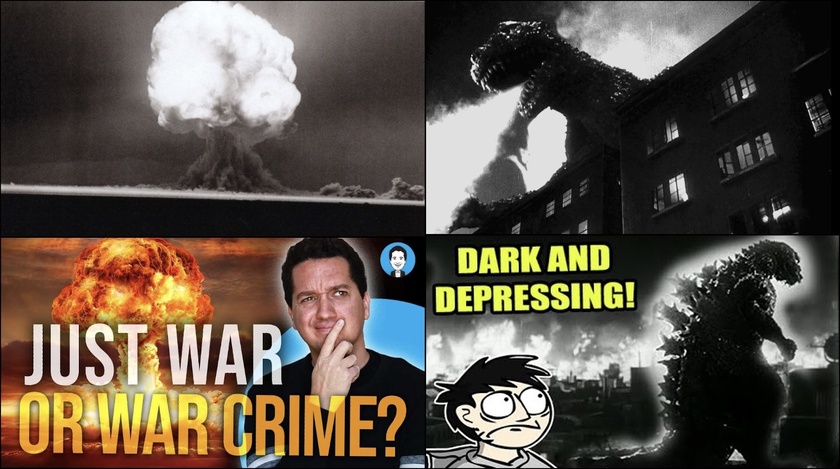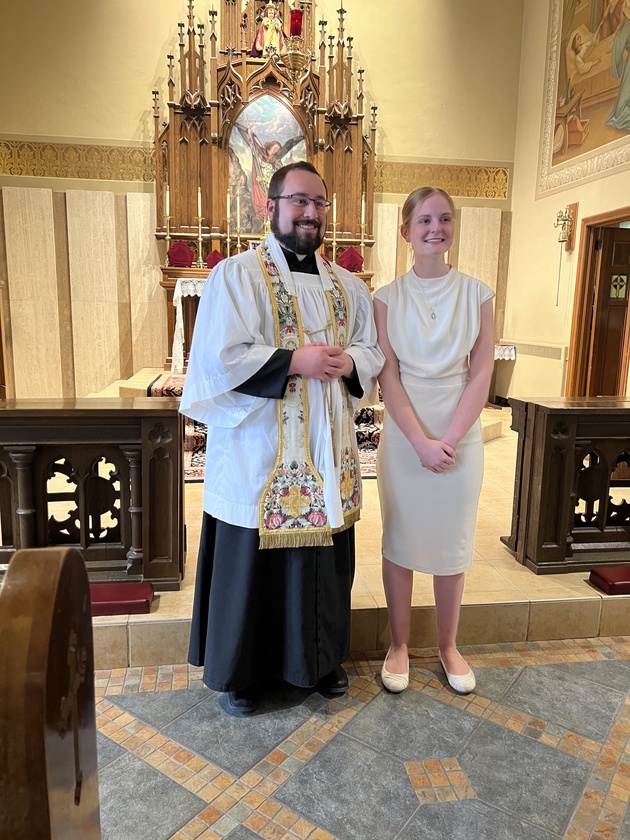Pop-Cultured Catholic #5: The Atomic Bomb, Godzilla’s Debut Film, and Just War Doctrine
This week has marked 79 years since the tragic and controversial bombings of Hiroshima and Nagasaki, leading up to the long awaited “Victory over Japan Day” of World War II. Given that, I figured I would delve into my favorite foreign film, 1954’s “Gojira”/“Godzilla” (the original Japanese cut). That is, while attempting to tread delicately into the sensitive subject matter which inspired it, from a Catholic perspective.
Far from the campy and escapist entertainment that many later Godzilla movies would be known for, the original 1954 film is a haunting anti-war allegory, about the horrors of nuclear warfare and other weapons of mass destruction the future might yield. To sum up the plot as briefly as possible, an ancient fire-breathing sea monster named Godzilla has been unknowingly caught in the blast of a Hydrogen bomb test. The now scarred and irradiated beast turns hostile, destroying numerous ships, terrorizing islanders, and eventually making landfall on Tokyo itself. No amount of conventional weapons like artillery and tanks can reliably repel Godzilla, and Tokyo is reduced to a burning radioactive wasteland, littered with the dead and dying. With the threat of Godzilla moving on to destroy other cities around the world, the only available solution lies in a scientist’s no-win dilemma.
One character named Dr. Daisuke Serizawa is burdened by this dilemma, having accidentally invented a new super-weapon, which is even more brutally efficient than the atomic bomb and may be the only means to kill Godzilla. Dr. Serizawa’s new weapon is barely explained, allowing it to stand in for any possible future weapon which could rival or even supersede the atomic bomb. The only clue given is that the weapon disintegrates living things around it flesh-and-all, and a crucial step of its process involves the breakdown of oxygen atoms. Given the Cold War that has begun to brew, Dr. Serizawa is terrified that the world’s regimes will seek to replicate and mass-produce his “Oxygen Destroyer”, if he reveals it. In the end, Serizawa chooses to use his weapon once and then take its secrets to his grave, by destroying all records of his research and allowing himself to die with Godzilla in the Oxygen Destroyer’s detonation. The film ends on a foreboding line, “I can't believe that Godzilla was the last of his species. If nuclear testing continues, then someday, somewhere in the world, another Godzilla may appear”.
The film’s atmosphere, spectacle, Japanese performances, and timeless messages hold up surprisingly well, and I am unashamed to say that this is one of the few movies which can still make me cry almost on command. When I revisited that film in its proper Japanese cut, while also fully understanding its subtext for the first time, it really got to me emotionally. It is one thing to simply read that people felt existential dread during the Cold War era, once the Pandora’s Box of nuclear warfare has been forever opened. It is another to actually see a work of art, which effectively conveys what that dread must have felt like, especially from the perspective of civilians who witnessed and experienced its devastating power firsthand. This kaiju monster flick puts more focus on the civilian tragedies, such as one scene of a mother facing certain death and telling the children in her arms that they will all be joining their father soon. What especially gets me a lot are its scenes which show the aftermath of Tokyo‘s destruction, the hospitals overflowing with Godzilla’s victims (including irradiated children and their dead parents), and the choir of schoolgirls singing a “Prayer for Peace”. The first two evoke much of the imagery surrounding Hiroshima and Nagasaki’s aftermath, and the third is what finally persuades Dr. Serizawa to use his weapon. Godzilla’s fury and nigh-invulnerability echo the devastation of a nuclear attack and a conventional army’s inability to protect against it. And Serizawa’s dilemma illustrates how simply having our own weapons of mass destruction to retaliate with is not enough to truly ensure peace. Paragraph #2315 of the Catechism even makes this very point.
If we as Catholics are to look back and morally evaluate the bombings of Hiroshima and Nagasaki, plus look onwards to hypothetical future uses of such weapons, it may help to first consult Catholicism’s doctrines of Just War. Paragraph #2309 of the Catechism outlines four requirements for the entering of a war to be just, one of which is that “the use of arms must not produce evils and disorders graver than the evil to be eliminated. The power of modern means of destruction weighs very heavily in evaluating this condition”. Onwards, “The Church and human reason assert the permanent validity of the moral law during armed conflicts. ‘The mere fact that war has regrettably broken out does not mean that everything becomes licit between the warring parties.’ Non-combatants, wounded soldiers, and prisoners must be respected and treated humanely. Practices deliberately contrary to the law of nations and to its universal principles are crimes”. In other words, besides having just grounds to declare a war, every individual act committed during said war must be morally sound and attempt to distinguish between threats and non-threats. Even if one’s actions and intents are much better compared to the enemy’s atrocities, God’s law is still the standard to abide by.
I will attempt to relay some reasons why the Catholic Church’s consensus nowadays is that the bombings of Hiroshima and Nagasaki were unjustified acts (while also being fair by acknowledging at least two arguments from the opposing viewpoint afterwards). Given the importance of distinguishing combatants and civilians, plus the intrinsically evil nature of murdering innocents, many apologists like Trent Horn have argued that the atomic bombings are a prime example of seeking a good end through evil means. They appear to have helped end the war sooner, seemingly leading to a lower number of American and Japanese deaths. However, those bombings were not aimed at strictly military targets. And if the method of ending the war is specifically contingent on the deaths of civilians (versus some civilians dying as an unwanted byproduct), then it sets a harmful precedent for the sanctity of innocent life and arguably becomes tantamount to terrorism. This observation seems to have influenced the Catechism’s Paragraph #2314, “‘Every act of war directed to the indiscriminate destruction of whole cities or vast areas with their inhabitants is a crime against God and man, which merits firm and unequivocal condemnation.’ A danger of modem warfare is that it provides the opportunity to those who possess modern scientific weapons - especially atomic, biological, or chemical weapons - to commit such crimes…”.
However, there are complicating circumstances to acknowledge, which may encourage us to harbor some understanding and mercy towards our forefathers, even if we find their actions to be mistaken and seek to not repeat them. Obviously, the Japanese military during WWII was infamous for idolizing Emperor Hirohito like a god, refusing to surrender, and preferring to die for their government in the name of honor. Besides the notorious kamikaze tactics, there was even a time when Hirohito did finally choose surrender, and one Japanese faction responded by attempting a coup to continue the war. It has been argued that Hirohito’s cultish hold extended to many civilians as well, who may have been willing to join in fighting American troops. If so, then perhaps it made the line between “Japanese civilians” and “Japanese combatants” appear blurrier in the eyes of America’s leaders. Though, that still does not warrant assuming all Japanese civilians are now enemies. Due to the earlier evangelization of Saint Maximilian Kolbe, for example, there was even a Catholic population in Nagasaki leading up to its bombing. Also, it is commonly brought up that some leaflets were reportedly dropped in those cities, warning people of the incoming attacks. Small as it may be, people have cited that as an attempt to at least reduce the death tolls. Other factors include similarly questionable tactics still being normalized for the time, like carpet bombing Berlin or firebombing Tokyo. Not to mention the conflicting evaluations over how many American troops were projected to die in a conventional invasion, whether Japan might have surrendered without Nagasaki’s bombing, whether the threat of Russia’s invasion could have made Hirohito surrender to America independently of the atomic bombings altogether, etc. These complicating factors, combined with someone lacking the benefit of hindsight, can contribute to the right choice being less easy to recognize and choose in the immediate time.
To end this analysis, I find the original 1954 Godzilla film to be a masterpiece, whose quality and commentary have not been matched until last year’s “Godzilla Minus One”. In each their own ways, both of these films by Toho are a reminder of how our responsibility to wage war ethically and value human life on all sides has only grown, with the new arsenals we have today. And given the current events unfolding, the world could still use another global “Prayer for Peace”.
For anyone who may want even more info, I would like to share some links to this really neat YouTube essay on the 1954 film by Steve Reviews, Apologist Trent Horn’s commentary on whether the atomic bombings were justified, the 1954 Godzilla film’s full Japanese cut on YouTube for free (for anyone using a desktop), two clips from the film, and two recordings of the “Prayer for Peace” soundtrack I love.
“Steve Reviews: Godzilla 1954 (The Original)”
https://www.youtube.com/watch?v=QwMgj8I3b2Y
Trent Horn’s “Were the Hiroshima and Nagasaki Bombings War Crimes?”
https://www.youtube.com/watch?v=6amuetZv-eM
The Full Japanese Cut of Godzilla 1954 on YouTube For Free (Requires Desktop Device)
https://www.youtube.com/watch?v=nn-Wg1NU32I
Short Segment of Godzilla’s Rampage in Tokyo
https://www.youtube.com/watch?v=EjNYWCH-fJw
Back-to-Back Clips of the Distressed Mother, Ruined Tokyo, and Overflowing Hospitals
https://www.youtube.com/watch?v=xDDf7bnj_KM
Akira Ifukube’s “Prayer For Peace” (Original Recording for the Film)
https://www.youtube.com/watch?v=njDSd8e6o70
“Prayer For Peace” (Kaoru Wanda’s Higher Quality Re-Recording With Added English Translations)
https://www.youtube.com/watch?v=SowvXSmiIXo





























